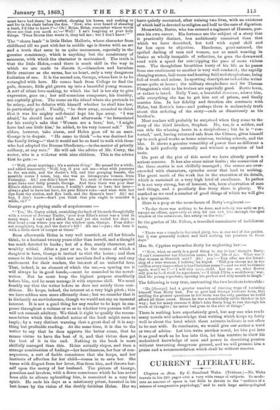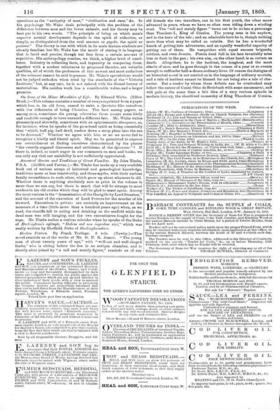CURRENT LITERATURE.
Chapters on Man. By C. Staniland Wake. (Trubuer.)—Mr. Wake travels in his 320 pages over a very wide range of subjects. So moderate an amount of space is but little to devote to the "outlines of a science of comparative psychology," and to such large anthropological questions as the "antiquity of man," "civilization and race," &c. In his psychology Mr. Wake deals principally with the problem of the difference between man and the lower animals, and his theory may be beat put in his own words. "The principle of being on which man's superior mental development depends is the spirit of reflection, or simply, as distinguished from the soul essence or psyche, the spirit or pneuma." The theory is one with which in its main feature students are already familiar, but Mr. Wake has the merit of stating it in language that is lucid and precise, though not free from a certain amount of repetition. His anthropology reaches, we think, a higher level of excellence. Industry in collecting facts, and ingenuity in comparing them, together with a modest reluctance to propound theories, are valuable qualities, all of which the professors of this newest and most audacious of the sciences cannot be said to possess. Mr. Wake's speculations would not be judged orthodox when tried by the standards of the " Victoria Institute," but, at any rate, he is not tainted with the dismal heresy of materialism. His maiden work has a considerable value, and a larger promise.
On Some of the Minor Moralities of Life. By Edward White. (Elliot Stock.)—This volume contains a number of essays reprinted from a paper which has, in its old form, ceased to exist, a Spectator like ourselves, with the differentia of being Christian. The bust among papers, as among men, sometimes die young, otherwise those essays seem lively and readable enough to have ensured a different fate. Mr. White writes pleasantly and shrewdly, sometimes with an epigrammatic sharpness, as, for instance, when ho speaks of the go-a-head spirit as being essentially that "which, half pig, half devil, rushes down a steep place into the sea to be drowned." Whether we agree with him or no we never fail to recognize a kindly and liberal spirit. May we be permitted to express our astonishment at finding ourselves characterized by the phrase "the sweetly-sugared discourses and criticisms of the Spectator"? If there is, indeed, so much sugar in our comments on men and books, we can only say that our amiability is not sufficiently appreciated.
Ancestral Stories and Traditions of Great Families. By John Timbs, F.S.A. (Griffith and Farran.)—Mr. Timbs has made up a very readable book out of various scraps of historical and genealogical knowledge, traditions more or less trustworthy, and those myths, with their curious family resemblance to each other, which grow up about whatever is old. Whether there is anything absolutely new to print in the volume is more than we can say, but there is much that will be strange to most readers in his old stories which they will be glad to meet again. Among the most curious is the "Assassination of the Hartgills by Lord Stourton," and the account of the execution of Lord Forrers for the murder of his steward. Executions in private are certainly an improvement on the manners of a time (little more than a hundred years ago) when, as wo read, the sheriffs fell to eating and drinking on the scaffold while the dead man was still hanging, and the two executioners fought for the rope. Mr. Timbs makes a curious mistake when he speaks of the Duke of Buckingham's epitaph, "Dubius sed non improbus viii," which was really written by Sheffield, Duke of Buckinghamshire.
Broken Fetters. By Frank Trollopo. 3 vols. (Newby.)—This novel reminds us of the works of Mr. G. P. R. James. " The young man of about twenty years of age," with "well-set and well-shaped limbs," who is sitting before the fire in an antique chamber, and is shortly after joined by "a tall and stately figure," reminds us of our old friends the two travellers, one in his first youth, the other more advanced in years, whom we have so often seen riding down a winding road. The "tall and stately figure " turns out to be no less a personage than Theodore I., King of Corsica. The young man is his nephew,. and is the hero of the tale ; and an admirable hero he is, though nothing more than what may be called an outside. But he has a wonderful knack of getting into adventures, and an equally wonderful capacity of getting out of them. He vanquishes with equal success brigands, soldiers, and even Jesuits. Pistols fired full in his face invariably miss him or flash in the pan ; his own aim, on the other hand, is as certain as death. Altogether, he is the luckiest, the toughest, and the most elastic of men, and he goes through in the course of a year or so events enough to suffice for half-a-dozen ordinary lives. Of course the dialogue of an historical novel is not carried on in the language of ordinary mortals, and a tale of incident cannot be blamed for not being also a tale of character. But a reader by whom these defects can be overlooked may follow the career of Count Otho de Breisbach with some amusement, and will gain at the same time a fair idea of a very curious episode in modern history, the shortlived monarchy of King Theodore of Corsica.



































 Previous page
Previous page